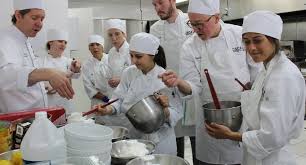The Art of Culinary Cooking: A Journey Through Flavours
Embarking on a culinary journey is more than just mastering recipes; it’s about understanding the artistry and science behind cooking. Culinary cooking schools offer enthusiasts a platform to delve deep into the world of gastronomy, where flavours, techniques, and traditions converge to create culinary masterpieces.
At a culinary cooking school, students are immersed in a hands-on learning experience that goes beyond following instructions. They learn the fundamentals of cooking – from knife skills to flavour pairings – under the guidance of seasoned chefs who share their expertise and passion for food.
One of the most enriching aspects of attending a culinary school is the opportunity to explore diverse cuisines from around the world. Students get to experiment with ingredients they may have never encountered before, broadening their palate and understanding of global flavours.
Moreover, culinary schools foster creativity and innovation in the kitchen. Students are encouraged to think outside the box, experiment with new techniques, and develop their signature style. The kitchen becomes a canvas where they can express themselves through food.
Beyond honing their cooking skills, students at culinary schools also learn about food safety, sustainability practices, and the importance of using fresh, seasonal ingredients. These values not only shape their approach to cooking but also instil a sense of responsibility towards the environment and community.
Whether aspiring chefs dream of opening their own restaurant or simply want to elevate their home-cooking game, a culinary cooking school provides them with the tools and knowledge needed to succeed in the competitive world of gastronomy.
So, if you have a passion for food and an appetite for learning, consider enrolling in a culinary cooking school. Embark on a journey that will not only sharpen your skills but also ignite your love for all things delicious.
Top 5 Frequently Asked Questions About Enrolling in Culinary Cooking School
- What qualifications do I need to enrol in a culinary cooking school?
- How long does it take to complete a culinary cooking course?
- What types of cuisines are taught at culinary cooking schools?
- Are there any scholarships or financial aid options available for culinary school students?
- Do culinary schools offer job placement assistance or internships?
What qualifications do I need to enrol in a culinary cooking school?
To enrol in a culinary cooking school, the qualifications required typically vary depending on the institution and the specific programme you are interested in. While some culinary schools may not have strict academic prerequisites, a passion for food, creativity in the kitchen, and a willingness to learn are often considered essential attributes. Many culinary schools welcome students from diverse backgrounds, ranging from beginners with a keen interest in cooking to seasoned home cooks looking to refine their skills. Some advanced programmes may require prior culinary experience or relevant qualifications, so it’s advisable to research the specific requirements of the culinary cooking school you wish to attend before applying.
How long does it take to complete a culinary cooking course?
The duration of a culinary cooking course can vary depending on the specific programme and institution. Typically, culinary cooking courses range from a few weeks to several months in length. Short-term courses may focus on specific skills or cuisines, offering a condensed but intensive learning experience. On the other hand, longer courses, such as diploma or degree programmes, provide a comprehensive education in culinary arts, covering a wide range of topics from basic techniques to advanced culinary concepts. Ultimately, the length of time it takes to complete a culinary cooking course is influenced by the depth of knowledge and practical skills that students aim to acquire during their culinary journey.
What types of cuisines are taught at culinary cooking schools?
Culinary cooking schools offer a diverse range of cuisines to cater to the varied interests and palates of aspiring chefs. Students can expect to learn about traditional French cuisine, known for its emphasis on technique and precision, as well as Italian cuisine with its rich flavours and rustic charm. Asian cuisines such as Thai, Japanese, and Chinese are also popular choices, allowing students to explore the intricate balance of flavours and unique cooking methods. Additionally, culinary schools often include courses on Mediterranean cuisine, showcasing the vibrant ingredients and bold flavours of countries like Spain, Greece, and Morocco. Whether students are drawn to classic dishes or exotic flavours, culinary cooking schools provide a comprehensive culinary education that celebrates the diversity of global gastronomy.
Are there any scholarships or financial aid options available for culinary school students?
For aspiring culinary school students seeking financial assistance, many culinary schools offer scholarships and financial aid options to help alleviate the cost of tuition. These scholarships may be merit-based, need-based, or awarded for specific achievements or contributions to the culinary field. Additionally, students can explore external scholarship opportunities offered by culinary organisations, foundations, and industry sponsors. By researching and applying for these financial aid options, aspiring chefs can pursue their passion for cooking without being burdened by financial constraints.
Do culinary schools offer job placement assistance or internships?
Many culinary schools offer job placement assistance and internship opportunities to their students as part of their comprehensive culinary education programmes. These services are designed to help aspiring chefs transition from the classroom to the professional kitchen seamlessly. Job placement assistance may include career counselling, resume building workshops, networking events with industry professionals, and job postings from partner establishments. Internships provide students with invaluable hands-on experience in real kitchen environments, allowing them to apply their skills and knowledge in a practical setting while learning from seasoned chefs. These opportunities not only enhance students’ culinary skills but also help them establish connections within the industry, paving the way for a successful career in the culinary world.

